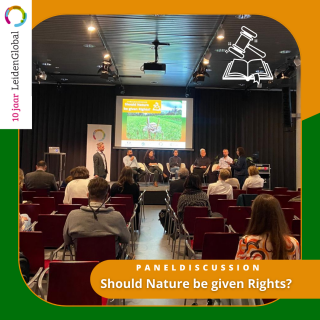The idea that nature should have legal rights is becoming more popular around the world. But is giving legal rights to nature the best way to improve our relationship with the environment? For example, if nature had legal rights, could governments or companies sue rivers for flooding? Also, could giving ecosystems legal rights harm Indigenous communities, whose views often inspire these movements?
At this year’s Annual LeidenGlobal event, a group of experts and activists, talked about these challenges. The panel, consisting of Shivant Jhagroe, Erna Lilje, Bernardo Ribeiro de Almeida, Diana Suhardiman, Diana Vela Almeiday* were asked to respond to a few statements, moderated by David Kloos and Marja Spierenberg.
The statements:
1. Nature’s Rights and Human Rights should be regarded as 2 sides of the same coin.
2. The Rights for Nature Movement strengthens or hurts the Indigenous Rights Movement.
3. Conceptualizations of Nature are plural. Enforcing a Rights discourse on Nature is dangerous.
The experts agreed that the issue depends on the context and how we define "nature". In this discussion, nature should be regarded not as an object but as a subject. Over the last 15 years, movements for global rights have grown, and many people now call for better protection of the environment through legal rights for nature. Advocates for nature’s rights seek stronger protections for the environment, but does this imply that current legal systems are failing? Not necessarily. Legal systems are designed to work in specific ways. It's not that they have failed us, but rather that they function within the laws they are designed to enforce. This raises the question: can the law achieve something that politics has not?
While it’s clear that more must be done to protect nature, introducing new laws could have unintended consequences. Lawyers might exploit loopholes, ultimately causing more harm to the environment. Thus, the details of these laws are crucial to consider. Moreover, if human rights are often disregarded by countries that have committed to them, why should we assume that rights for nature would be any different? Another debate would likely arise around responsibility and territorial boundaries. For instance, are we referring to a single mountain, or the forests on that mountain, which may stretch across multiple areas? And who, exactly, would represent nature? Who has the authority to give nature a voice?
In the end, the effectiveness of nature’s rights depends on context. The concept shouldn’t be seen as exclusive but as one tool among many. Different legal and social systems intersect in this discussion.
Panel*
The paneldiscussion was moderated by Marja Spierenburg (Professor Anthropology of Sustainability and Livelihood, Leiden University) and David Kloos (Senior Researcher at KITLV / the Royal Netherlands Institute of Southeast Asian and Caribbean Studies).
Many thanks for the contribution of these panel members:
- Shivant Jhagroe, Assistant Professor at the Institute of Public Administration, Leiden University. His current research focuses on marginalised and more-than-human actors in policy and politics (e.g. racialised/low-income groups, ecosystems, algorithms).
- Erna Lilje, Curator Indigenous Knowledge and Material Culture at the Research Centre for Material Culture (RCMC), Wereldmuseum Leiden. [TBC]
- Bernardo Ribeiro de Almeida, Ass. Professor at the Leiden University College (LUC) and at the Van Vollenhoven Institute (VVI). Researcher and practitioner in land tenure, law, lawmaking and development and is currently researching the nexus between climate change response and land rights.
- Diana Suhardiman, Director of KITLV/the Royal Netherlands Institute of Southeast Asian and Caribbean Studies and Professor of Natural Resource Governance, Climate and Equity at Leiden University. Working at the intersection of water, land, climate, and environmental governance.
- Diana Vela Almeida, Ass. Professor on Political Ecology of Sustainability, Copernicus Institute, Utrecht University. She works at the interface between the fields of political ecology, ecological economics and feminist critical geography.
Prior to the panel discussion, Shivant Jhagroe and Diana Vela Almeida also gave a MasterClass on the subject:

The LeidenGlobal Annual Event 2024 was organised by KITLV/Royal Netherlands Institute of Southeast Asian and Caribbean Studies and Cultural Anthropology & Development Sociology at Leiden University, at Wereldmuseum Leiden.
Also read the LeidenGlobal interview with Shivant Jhagroe "Legal Rights for Nature: a stepping stone or a dead end?"

